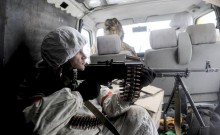Whereas Kuchma unsuccessfully waited to meet Zakharchenko in Minsk – the same terrorist Zakharchenko who obliterated a passenger bus in Volnovakha and managed to overpower the “cyborgs” – a drama was unfolding around the cities of Debaltseve and Vuhlehirsk. A battle is going on there, unceasing to this moment. The circumstances change every hour, reports from different sources contradict each other and often rapidly become obsolete. Yet they are being argued upon, delved into and elaborated, as it is customary among the experts and social network users. The absence of official information invariably prompts those, who are distant to the reality and intimate to heavenly insights and prophetic predictions, to fill the void. The opinions are divided, whether to abandon the homeland of Volodymyr Sosiura and avoid being encircled or to use it as a foothold for future advance.
Regarding the unfortunate experience of stalled armored vehicles, which Stepan Poltorak, the minister for defense, promised to investigate, an advance seems unlikely. One thing is clear – the terrorists are indifferent to their losses. And the issue is not only due to “narkom’s 100 grams” (or, for that matter, “milliliters” or “joints”) being administered, but also by virtue of the historically tested method of waging wars. The Russians bet on sheer numbers and know that “the human resource will not be lacking.” And that’s why they arrogantly rejected the Minsk accords. Putin is certain he would be able to impose his will across every bit of the frontline he sees interest in – through filling it up with the bandits’ corpses. And only then he will be ready to negotiate.
At the same time, the insurgents demand a unilateral ceasefire from Poroshenko. Following these events and statements it is possible to assert – if it were not for the hesitation, not for the seeking of a compromise while sitting on the frying pan, not for sending “the peace-maker” Kuchma to negotiate, not for lacking a clear-cut and resolute position altogether, we would eventually have a capacity for pressure and would not be so vulnerable. The military heroism, sometimes borderline to fanaticism, shows that we still have soldiers. The argument is about timeliness and building up the offensive potential. After all, delays and vagueness imply an irresponsible leadership, or worse – a possibility of alternative hidden agreements. At any rate, such assumptions were heard among the people.
What’s happening on the frontline? In Vuhlehirsk a decisive attack over the course of the weekend was able to lift the blockade of our troops and lead them out of encirclement. The numbers of our losses, as well as the enemy’s, are subject to a constant change. The most serious casualties we faced in the east of Vuhlehirsk. The official death toll is several dozens of our soldiers and hundreds of enemies. As Dmytro Tymchuk, MP, said: “There are circa 3,500 terrorists involved on the enemy side at Debaltseve. Their attacks, being continually fended off by our artillery, come from Chornukhyne and Vuhlehirsk, which is already occupied by the insurgents. January 31 was the day of the pivotal battle. But the bandits had thought that their attack on Debaltseve would be a simple trick, and things turned out differently for them. The terrorists relied on inciting panic among the army ranks, and some “analysts” on our side tried to help them in that regard. But there was no panic. The outlaws were repelled from Debaltseve to their prior positions. There is a discontent among the ranks with the battalion commanders, who sought to score political points from the events in the Donbas, using it as an excuse to tell not about the actual events, but about themselves. A gap of mere ten kilometers prevents the complete encirclement, but our army defends well. Assistance is still an issue. Further offensives are to be expected, but the situation is hard to predict.”








